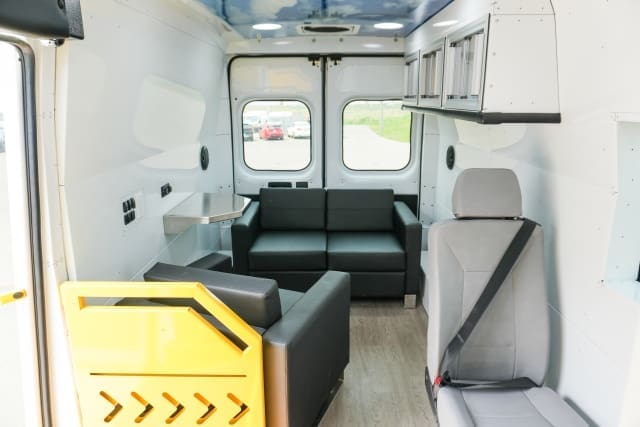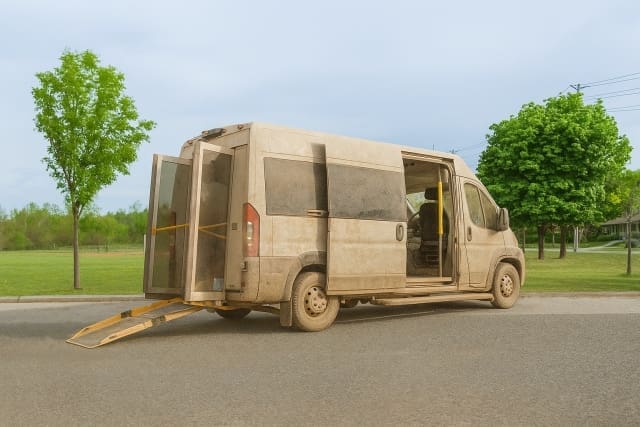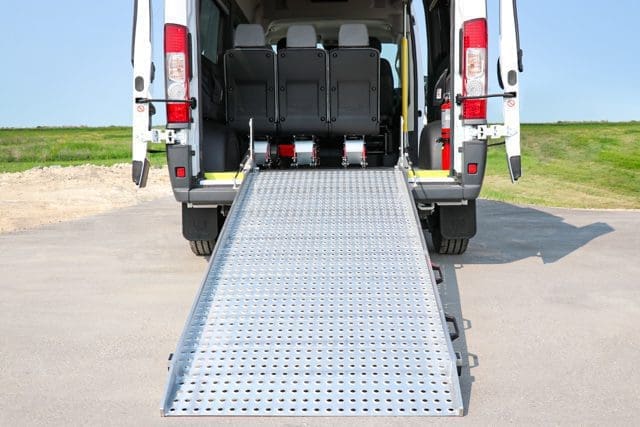Vancouver’s mental health crisis is growing, and it can’t be ignored any longer.
Whether it’s the visible struggles on the Downtown Eastside, the pressure on emergency departments, or the waitlists that drag on for months, you’ve seen it. Maybe you’re a healthcare provider, a government agency, or a community leader. You’ve seen the need. You’ve seen the gaps. And you want to do more, but budgets, buildings, and burnout are getting in the way.
Here’s the hard truth:
If nothing changes, more people will slip through the cracks.
- More untreated mental illness
- More mental health emergencies
- More deaths from suicide and overdose
But what if care didn’t have to wait?
What if it rolled up, right to where people already are?
At MoveMobility, we’re helping organizations bring mental health care directly to communities with Mobile Counselling Vans. These purpose-built vehicles remove physical, financial, and systemic barriers so more people can access help sooner.
In this article, you’ll learn:
- Why Vancouver’s mental health crisis is escalating
- How a Mobile Counselling Van offers real solutions
- What you should consider before launching a mobile mental health program
The mental health crisis in Vancouver: Why is it urgent?
1 in 5 people in British Columbia will experience a mental health or substance use issue in any given year.
In Vancouver, the numbers are especially concerning:
- Mental health-related ER visits increased by 67% from 2013 to 2022
- Youth in crisis: A 2023 report showed 1 in 5 B.C. teens had seriously considered suicide
- Toxic drug crisis: More than 2,500 people died in B.C. from overdose in 2023, many with co-occurring mental health issues
- Downtown Eastside: This area has become symbolic of the overlapping crises of trauma, homelessness, and substance use
- Waitlists: Publicly funded mental health services can take months to access, if available at all
The situation is particularly challenging for:
- Indigenous people experiencing intergenerational trauma
- Racialized and immigrant communities facing cultural and language barriers
- Youth without parental support
- Seniors isolated in low-income housing
It’s a perfect storm. And brick-and-mortar clinics alone can’t meet the need. That’s where mobile mental health support can step in.
How can a Mobile Counselling Van help with Vancouver’s mental health crisis?
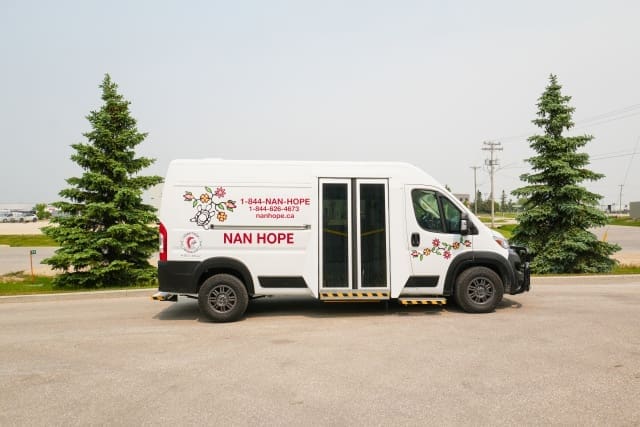
The Mobile Counselling Van offers several features that make it such a strong solution for Vancouver’s mental health crisis.
1. Comfort-first design encourages people to open up
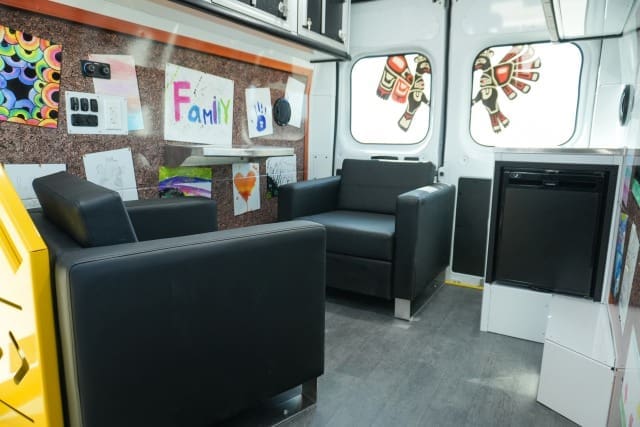
Traditional clinics can feel cold, clinical, and intimidating. In contrast, Mobile Counselling Vans are designed to feel like a warm, welcoming living room. The inside features soft lighting, cozy seating, and calming tones.
Why it works:
- Helps new clients feel safe and relaxed
- Makes therapy feel more like a conversation than a clinical procedure
- Breaks down stigma, especially in communities with cultural barriers
2. Built-in privacy means confidential conversations
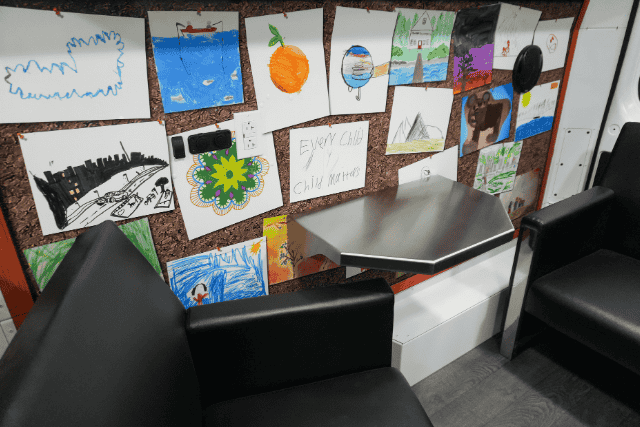
Stigma is still a huge barrier, especially in tight-knit neighbourhoods. People may worry about being seen entering a counselling space.
With a Mobile Counselling Van:
- Tinted windows and soundproofing protect privacy
- No waiting rooms, no paperwork at the front desk
- Clients can share safely and confidently
3. Fully accessible for all abilities
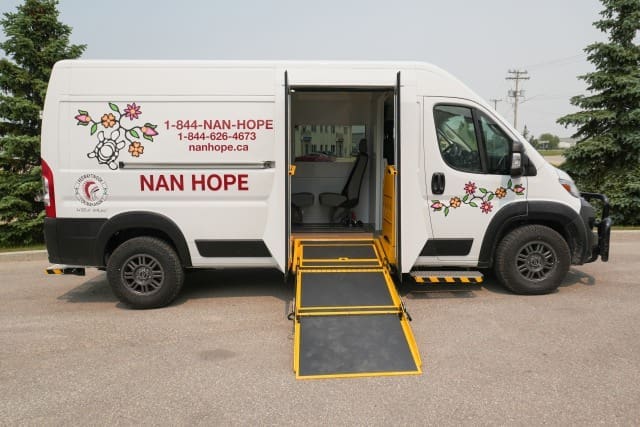
The van is wheelchair accessible, with a low-step or ramp entrance. The layout allows mobility aids, service animals, and personal support workers to move freely inside.
This matters for:
- Elders with walkers
- Veterans with injuries
- People using wheelchairs or scooters
4. Reliable connectivity for virtual care
Many mental health workers offer a hybrid model: in-person support and virtual follow-up. Mobile Counselling Vans include Wi-Fi and power hookups so staff can access digital records or connect clients to online specialists.
Use cases:
- Virtual psychiatry sessions from a shelter parking lot
- Follow-up calls with case managers
- Real-time access to provincial mental health databases
5. Cultural safety features build trust
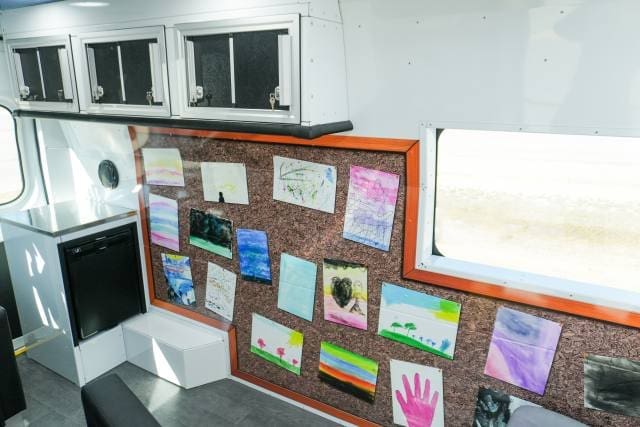
Care that doesn’t feel culturally safe doesn’t work. Period.
You can customize the van’s design with:
- Indigenous artwork or traditional motifs
- Signage in multiple languages
- Space for spiritual items like medicines or smudging tools
You’re offering a combination of care and belonging.
6. Flexible layout for a variety of services

The van isn’t limited to one purpose. It can be configured to support multiple needs:
- One-on-one counselling
- Peer support drop-ins
- Group sessions or wellness check-ins
- Distribution of hygiene supplies, Naloxone kits, or snacks
The seating and storage options can be adapted seasonally or per event.
7. Built for Vancouver’s terrain and climate
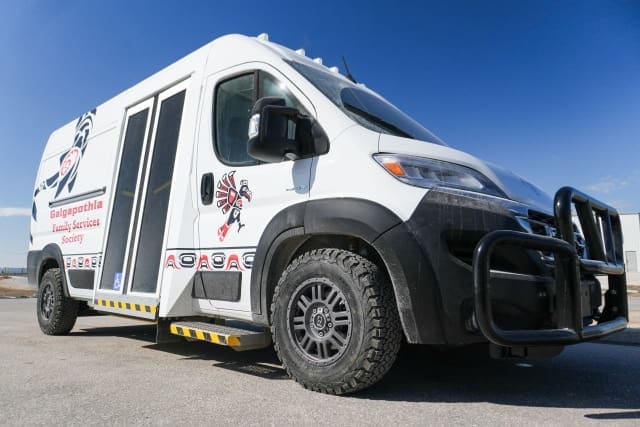
Rain. Hills. Narrow alleys. A Mobile Counselling Van needs to be tough.
MoveMobility offers a Trail Edition upgrade that helps you:
- Navigate downtown side streets or mountain roads
- Park safely on gravel or sloped surfaces
- Keep clients warm in winter and cool in summer
8. Keeps staff and clients safe
The van can be outfitted with:
- Motion-triggered lighting
- Security cameras
- Panic button systems
- Lockable compartments for gear and medication
Whether you’re parked outside a youth drop-in or at a nighttime outreach event, safety matters.
6 Things to Consider Before Launching a Mobile Mental Health Program in Vancouver
Before you dive into starting a mobile mental health program in Vancouver, you should consider a few things.
1. Do you need a mobile model or a physical space, or both?
Start by mapping your service area. If you’re serving downtown Vancouver, a fixed location might be enough. But if you work with clients in:
- Burnaby, Surrey, Langley, or Coquitlam
- Indigenous communities along the Fraser River
- Clients experiencing homelessness who move frequently
…a Mobile Couselling Van will let you meet people where they are, instead of waiting for them to come to you.
2. Who are you trying to serve, and how?
Understanding your target population helps define the van’s setup.
Ask:
- Will you support youth, adults, seniors, or all three?
- Are trauma-informed or harm-reduction models required?
- Is culturally rooted care (like smudging, prayer, or ceremony) important?
- Will the van include peer support workers or only clinicians?
The more specific you are, the more useful the van will be.
3. How will you staff the van?
A Mobile Counselling Van doesn’t run itself. You’ll need a reliable team:
- Mental health clinicians (counsellors, social workers, etc.)
- Outreach workers
- Peer support staff
- A driver (or staff trained in operating large vehicles)
Also consider partnerships with:
- Vancouver Coastal Health
- Foundry centres
- Indigenous Friendship Centres
- School districts or shelters
4. How will you fund the program long-term?
Initial funding is important, but so is sustainability.
Explore:
- B.C. Ministry of Mental Health and Addictions grants
- Health Canada pilot funding
- Philanthropic support from local foundations
- Partnerships with municipal or regional districts
Also consider:
- Billing MSP, where possible
- Offering group sessions to maximize capacity
- Sponsorships from local businesses
5. How will you raise awareness?
A van is only useful if people know it exists.
Promote your services through:
- Street outreach and flyers
- Partnerships with shelters, schools, and community groups
- Social media posts featuring the van’s story and photos
- Maps or schedules of the van’s stops
- Local media and radio campaigns
Don’t underestimate word of mouth. It travels fast in Vancouver communities.
6. How will you measure your success?
Funders, staff, and communities all want to know: Is it working?
You don’t need complex software, just clear metrics.
Track things like:
- Number of sessions provided
- Demographics served (youth, seniors, newcomers, etc.)
- Follow-up visits or referrals made
- Client satisfaction and feedback
- Community-level impact (ER diversions, overdose prevention, etc.)
Keeping track of these things helps you showcase the outcomes of your program.
A Mobile Counselling Van is a tool for change
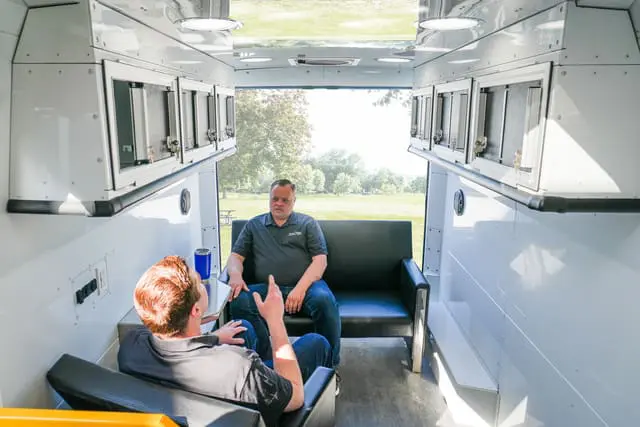
You came here wondering if a Mobile counselling Van could be the right solution to address Vancouver’s mental health crisis.
Now you know:
- The need is urgent
- The barriers are real
- And the solution doesn’t have to wait
With the right van, the right people, and the right plan, you can deliver hope, healing, and dignity straight to the communities that need it most.
At MoveMobility, we’ve helped countless Canadian organizations like Galgapotha and Keewaytinook Okimakanak Northern Chiefs Council launch mobile health services. We work closely with you to design vehicles that meet your team’s needs and your community’s reality.
Ready to see how a Mobile Counselling Van could fit your program? Click the button below to talk to a mobility expert so you can focus on what matters most: helping people.
Not ready to talk to someone yet? We have a couple of other resources you can check out in the meantime.
Start with our article on how mobile mental health clinics work, then explore our guide on mobile crisis response units to see how mobile services make a difference in your community.


